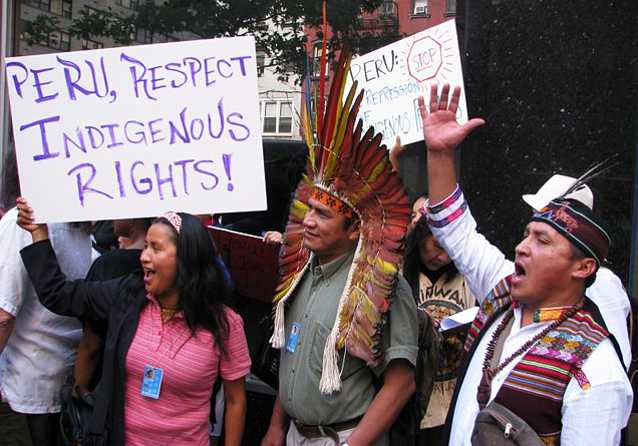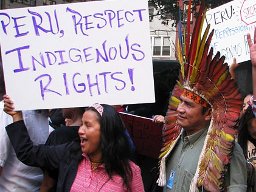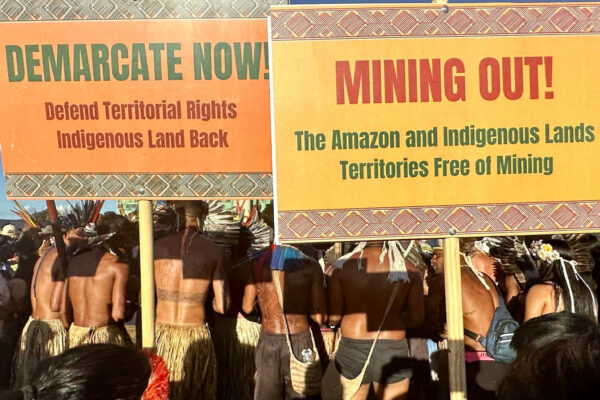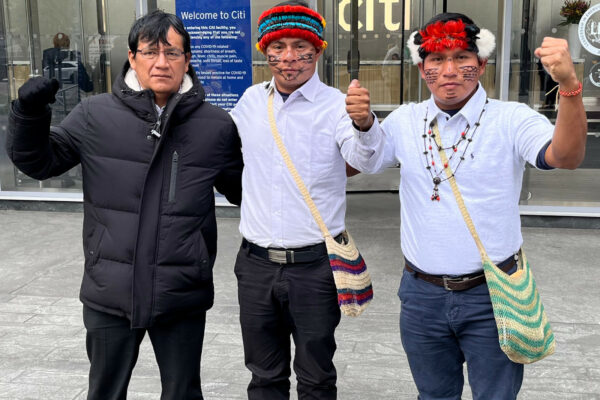
Peru elected a new president on June 5, the two-year anniversary of the Bagua massacre. Ollanta Humala, candidate of the Gana Peru political party, a former military officer turned “progressive”, defeated Keiko Fujimori, the daughter of former President Alberto Fujimori, who is currently serving a sentence for crimes against humanity. Humala was the only candidate to respond to the concerns of Peru’s indigenous populations in his campaign. What may his presidency signify for Peru’s indigenous peoples and the Amazon?
Of the many political issues before the new president, one is both recurrent and consistently ignored: the promotion and defense of indigenous rights. While the candidacy of Keiko Fujimori revealed serious doubts in respect to the issues of human and indigenous rights, and the electoral process, primarily in the second round, was highly controversial owing to a polarized electorate plagued by racism and discrimination, the social mobilization against Fujimori (both daughter and father) – in light of a history of corruption and human rights violations committed under the rule of Alberto Fujimori and the ex-candidate Kieko Fujimori’s failure to distance herself from her father’s government – has been encouraging. And while many civil society organizations have backed Ollanta Humala, in effect, the national Amazonian indigenous organization AIDESEP decided to back Gana Peru with the conviction that the party represented the best option for indigenous concerns. Despite the fact that the work plan laid out by Ollanta Humala includes indigenous issues, in light of his recent victory it is necessary to re-examine it.
Humala’s proposals show a clear initiation in respect for indigenous rights. Gana Peru’s work plan has outlined the approval and enactment of a consultation law (p.83,184-185). In Peru, less than five years ago, to speak of consultation was almost taboo, even though by that time Peru had been forced through ILO Convention No. 169 to engage in consultation with indigenous peoples in those cases which affected their territories and lives. Now, the incoming president promises to approve and enact a consultation law – a priority issue for the indigenous agenda yet nothing very innovative. The current government of Alan Garcia agreed to a consultation law after a round table discussion that was set up following the violent clashes at Bagua. He has not complied with the agreement. What’s more, his failure to comply with this agreement while passing a ruling about consultation in mining matters and proposing a forestry law signifies not only breaking the fragile and hard-earned confidence of indigenous peoples, but also continuing the downward trend towards an unequal society. Humala promises to break off from this; but will he?
We also find that Humala proposes the recognition of indigenous territories (p. 184-185), and with it the guarantee of the right to property for indigenous peoples. He also proposes intercultural education and healthcare (p. 184-185). And while there isn’t much clarity around what aspects of the economic model Humala proposes changing, he does declare that the profits in the extractive industry will be better distributed among Peruvian society. In other words, there are signs that point to a greater recognition of indigenous rights. Because of this it is important to mention that on many occasions Humala has proposed dialogue and participation as the road towards transformation. For indigenous leadership this is a fundamental starting point, since the systematic marginalization they have suffered for so long cannot change without their real and effective participation. We consider one of the primary tasks for the new government to create ties with indigenous communities through articulation in an atmosphere of good faith and mutual respect. The road is not simple, indeed it never has been, but indigenous peoples have proven through their struggle to be some of the greatest critics of the State of law and democratic government.
There remains a constant skepticism surrounding the candidate’s promises, yet the suspicion that he will not comply is in this case quite healthy, even necessary, in order to maintain a critical and vigilant position. From all the various spaces in which the Peruvian nation has shown its support for Ollanta Humala’s presidential nomination, it has also demonstrated its position in upholding a vigilant public. In this sense, it’s the new president’s duty not only to meet the level of confidence given to him, but also to maintain constant feedback that permits the recognition of national interests, not just those of a group of citizens, and to allow for critiques of his government to flow democratically. Thus, the answer to legitimate protest should not be criminalization; no one wants another Bagua. We can continue offering proposals – an effective demand of resource extraction companies to follow international legal guidelines or greater representation in the political sphere through laws that allow more indigenous leaders into Congress, local, and regional government – however, this is a job for the new government, but it will depend fundamentally on the agenda that indigenous groups prioritize through the dialogue and participation that Humala has proposed. We will be watching.
Angela Tapia is an Indigenous Rights Fellow from Puno, Peru.














